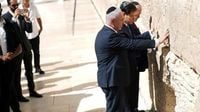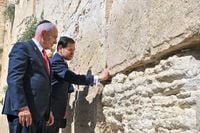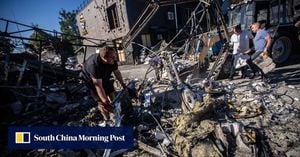U.S. Secretary of State Marco Rubio touched down in Israel on Sunday, September 14, 2025, embarking on a high-stakes diplomatic visit that unfolded against the backdrop of intensifying conflict in Gaza and mounting international scrutiny. Rubio’s arrival, greeted at Ben Gurion Airport by U.S. Ambassador to Israel Mike Huckabee and his wife, Janet Huckabee, marked not only a show of solidarity with Israel but also a pivotal moment in the ongoing debate over the future of the region.
Rubio wasted no time setting the tone for his visit. Before even boarding his flight from Washington, he made his priorities clear to reporters and on social media: "My focus will be on securing the return of hostages, finding ways to make sure humanitarian aid reaches civilians, and addressing the threat posed by Hamas." He added pointedly, "Hamas cannot continue to exist if peace in the region is the goal." According to ABC News, this message underscored the urgency and complexity of the U.S. mission in the region.
Upon arrival, Rubio was whisked directly to Jerusalem’s Old City, where he joined Israeli Prime Minister Benjamin Netanyahu at the Western Wall—Judaism’s holiest site. The two leaders, accompanied by their wives and Ambassador Huckabee and his wife, observed the centuries-old tradition of placing written prayers in the Wall’s crevices. Rubio’s note read: "May peace reign upon this Holy Land and in the world." The moment, captured by international media, was as symbolic as it was strategic, signaling unity between the U.S. and Israel at a time when their alliance faces unprecedented challenges.
Netanyahu, standing beside Rubio at the Wall, offered a public affirmation of the U.S.-Israel relationship, even as the war in Gaza and recent Israeli military actions have tested diplomatic ties. "I think his visit here is a testament to the resilience and strength of the American-Israeli alliance, which is as durable and strong as the stones of the Western Wall that we just touched," Netanyahu told reporters, according to The Times of Israel. He went further, expressing gratitude for U.S. support: "Under President Trump, Secretary Rubio and their entire team, this alliance has never been stronger, and we appreciate it very much." The prime minister also highlighted the historical significance of American backing, stating, "Not only on behalf of the people of Israel today, but also on behalf of the generations of Jews who came before us, in the hope that we will rebuild our country with friends like you. Thank you, Marco."
The Western Wall visit was more than a photo opportunity. Rubio, Netanyahu, and their entourage offered joint prayers for the safety of hostages held by Hamas in Gaza and a special prayer honoring U.S. President Donald Trump, whom Netanyahu described as "a true friend of the Jewish people and the State of Israel." This gesture, reported by ABC News, reflected both the personal and political dimensions of the visit.
Following the prayers, the group toured newly opened archaeological excavations from the Second Temple period, guided by Mordechai Suli Eliav, CEO of the Western Wall Heritage Foundation. The walk through ancient tunnels was a reminder of the deep historical roots at play in the current conflict—and the enduring symbolism of Jerusalem for both Israelis and Palestinians.
But the ceremonial aspects of Rubio’s trip belied the gravity of the issues on the agenda. According to Politico and The Times of Israel, Rubio’s visit came just days after an Israeli airstrike targeted Hamas leaders in Qatar—a U.S. ally—killing at least six people in Doha. The attack drew fierce condemnation from regional powers and strained relations between Israel, Qatar, and the Trump administration. President Trump, according to Rubio, was "not happy" about the strike, and the U.S. had not been notified in advance. Still, Rubio insisted that the incident would not alter the fundamental alliance between Washington and Jerusalem.
Rubio’s diplomatic mission was further complicated by the ongoing humanitarian crisis in Gaza. On the same day as his visit, Israeli forces intensified their assault on northern Gaza, flattening high-rise buildings and killing at least 13 Palestinians, including six members of a single family in Deir al-Balah, as reported by local hospitals and Associated Press video footage. Residents, already displaced multiple times, scrambled to escape the violence, with thousands seen fleeing Gaza City as smoke rose from fresh airstrikes. "We have begun to wish for death, death, rather than this life we live today," said Ashraf Elwan, a young man displaced from Gaza City, in a statement to AP.
Israel’s military justified the destruction of three high-rise buildings on September 14, including part of the Islamic University in Gaza City, by claiming that Hamas had used them as observation points for intelligence gathering and to prepare attacks on Israeli troops. However, the military did not immediately provide evidence to support these claims, and casualties from the strikes remained uncertain, with some bodies reportedly trapped in the rubble, according to Al-Shifa Hospital.
As the violence escalated, Rubio’s diplomatic itinerary included meetings with Netanyahu and other top Israeli officials to discuss not just the immediate crisis in Gaza but also broader regional security concerns. The U.S. State Department stated that Rubio would "convey America’s priorities in the Israel-Hamas conflict and broader issues concerning Middle Eastern security, reaffirming U.S. commitment to Israeli security." Among the topics reportedly on the table: the planned Israeli operation to seize control of Gaza City, the fate of hostages, and the flow of humanitarian aid.
Rubio’s trip also took on added significance ahead of a contentious United Nations General Assembly session, where Western nations are expected to debate the recognition of a Palestinian state. Netanyahu remains firmly opposed to such recognition, and, according to Axios and The Times of Israel, Rubio has warned that Israel could take "reciprocal" action—possibly annexing parts of the West Bank—if Western countries move forward with recognizing Palestinian statehood. While some U.S. officials worry that annexation could unravel the Abraham Accords and damage Trump’s legacy, Israeli officials have indicated that Rubio and the Trump administration would not stand in the way of such moves.
Rubio’s packed schedule included planned meetings with Foreign Minister Gideon Sa’ar and President Isaac Herzog, as well as participation in the inauguration of a new tunnel for visitors to the Temple Mount. Yet, throughout his visit, both Rubio and Netanyahu avoided public statements beyond their ceremonial appearances, leaving much of the diplomatic wrangling behind closed doors.
As the sun set over Jerusalem on Sunday, the stakes of Rubio’s visit could not have been clearer. With the humanitarian crisis in Gaza deepening, regional alliances shifting, and the prospect of unilateral Israeli action looming, the secretary’s presence in Israel served as both a symbol of enduring partnership and a reminder of the formidable challenges ahead.





